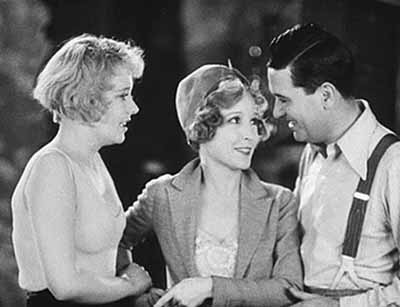When I was three we owned this record and I remember not understanding that I was not Maria. There was no clear separation between me and the movie. I was The Sound of Music and The Sound of Music was me.
We had this record:

And I don't remember a time when I didn't know every word to every song. I'm quite sure that I learned the words "dapper" "naive" and "ken" from 'Sixteen Going on Seventeen' and I'm sure that those three words alone could have been responsible for my reputation as a precocious three-year-old.
I've been to the sing-along Sound of Music but until two years ago I didn't own the movie. I never had. In a weird way it felt redundant. I own this movie in my head. If I'm knocked unconscious and start to ascend a tunnel of light I'll probably wake up singing "Climb ev'ry mountain" - it's that kind of thing for me.

Did I mention that the Mother Abbess is played by Peggy Wood? That's my grandmother's name.
I am going to put a limit on the ways I can love this movie, I am limiting it to ten.
These are a few of my favorite things:
1. The Sound of Music - the music. This movie is full of happy songs. There are a lot of dark, sad moments to this movie - the girl doesn't fit in at the Abbey, where she lives, she doesn't fit in at the place where she's sent to be a governess, but she's always so exuberant! The opening score is played over shots of the Swiss Alps and it's just this feeling of awe you can't help, which is exactly what Maria wants to sing about all the time.

"My heart wants to skip like a brook that trips over stones on its way, to sing through the night, like a lark that is learning to pray!" Put simply, it's a show-tune hymn, and a great one. People should sing it in church.
Because this is essentially a movie about music bringing people together and saving them from Nazis, there are too many other great songs to name and yes a few slow ones that I didn't care for as a child but now appreciate. And then there's Edelweiss - if your heart doesn't break when they sing that song at the end of the movie, I'm revoking it!
2. How do you solve a problem like - Nuns. How can you not love nuns? They are like the opposite of a pin-up poster - they are everything womanly that is not sexual. They're motherly and wise, girlish and innocent, demanding and patient, they nag, they gossip, they whine, and in the end of the movie they are heroic and clever and sneaky and you realize they are made of steel. Nuns! (someone is going to say, clearly I have never gone to Catholic school - clearly I have not).
3. Girls in white dresses with blue satin sashes. The kids in uniform! They are great - kids marching in a line and in matching costumes were so appealing when I was a kid. It was like watching a kid review or a kid army. And I still love the matching curtain-clothes - don't put it past me to have my own version for my kids.

Apparently Christopher Plummer was quite the player...
http://www.newyorker.com/talk/2009/12/21/091221ta_talk_parkerBut back to the list:
4. Uncle Max
He's a smooth cat, Uncle Max - the talent agent and perennial mooch. I bet the real Uncle Max moved to Hollywood to escape the Nazis and became someone like Sam Goldwyn. True, he's only out for himself but that makes him somewhat impartial. He cracks mean little jokes with the baroness but ultimately his fondness for a good musical act trumps his friendship with her and her lovely money. And if not for him, how would they ever have escaped at the end? Gotta love Uncle Max.
5. There's a ball. They throw a ball. They're just like - you know what would be fun? A big party in that big ballroom. And then they throw a ball. Complete with formal dinner and wonderful outfits and entertainment and Austrian folk dances.
6. There's a wedding. Any movie with a ball and a wedding is a winner in my book. The wedding is awesome, too - just her train alone is enough to bring a tear to my eye, but the organ playing "how do you solve a problem like maria" - all I can say is - why on earth didn't I think of having that as my processional? Jessica, take note, you still have a chance!
7. Free the children manifesto. Children hanging from trees and overturning rowboats. This is how life was meant to be lived. Up until the turn of the century, children were to be "seen and not heard" - kept apart from their parents in upper-class homes and trained to act like miniature adults. Fraulein Maria is a renegade, she's a local girl who ran around in the woods singing out loud to the mountains like a crazy person and she believes firmly that all children should be allowed to run around acting like crazy people. Children appreciate and respond to this message. They like to be crazy.
8. Love story #1 - star-crossed lovers Franz and Liesl. They meet in secret and fall in love - they have their first kiss during a thunderstorm, for pete's sake! Then he becomes a stupid Nazi - in part because the Austrians see him as a boy but the Nazi's will give him authority to rat people out. So instead of growing into a principled man, he'll become a soldier for the first army that will take him. Liesl can't believe he'd betray her family and her father and almost costs her family their lives because of it. Poor Liesl and, for that matter, poor Franz. He's just a boy being manipulated by a deeply evil regime.
9. Love story #2 - The Captain and Maria - he's her boss, he's handsome and wealthy and authoritative and precise. She's a free-spirited would-be nun who can't stop herself from contradicting anyone, even authority figures. But when they sing, they can't help but see each other as kindred spirits. Most of all, she truly loves his children, even to the point of risking her own job to argue with him on their behalf. She makes him realize that he loves his kids, too, and needs to be a better father to them. And she's just a simple country girl but you realize, he's really not fond of the city anyway - he likes nature and folk songs and traditional Austrian things - including traditional Austrian girls like Maria.
10. Sad/Happy Ending. So the Nazis invade Austria, but the family escapes. The real-life family survived, came to America, made their living performing, were happy and successful. But the Nazis are real, and they go on to do terrible things, and not everyone escaped. Austrians who had to give up their nation and leave their homes were the first victims of Hitler, and their hardships seem minor compared to others - but just the glimpse of the totalitarianism of the Nazi occupation - the flags everywhere, the spies, the insistence on a public show of loyalty and deference...sends a chill down your spine. Europe should have taken notice sooner. The Nazis started out by breaking spirits and banishing families and ended by bringing more evil into the world than many people had ever imagined existed in the human heart. When they sing Edelweiss, a folksong, they get to the "bless my homeland forever" part and you realize it's a secret protest. The voices in the crowd join in and sing and you sense the Nazis are not going to be able to keep these people down. Probably Victor Laszlo was in the crowd. Surreptitious subversion of cultural imperialism, rule-breaking nuns, hiking over the Alps to freedom...it's inspirational on top of everything else.
How can you not love this movie? I think I watched it once a year when I was little, and I'm sure I could sing you all of the songs if asked.
Four stars. Clearly another movie to watch over and over.
 It turns out they are destined for each other. What begins with, "I surveyed the whole boat...you're the most attractive woman on board...I thought, too bad she's married... this is going to be awkward," turns into a relationship that continues in London and causes them both to drop their player ways (but not without some hesitation)...
It turns out they are destined for each other. What begins with, "I surveyed the whole boat...you're the most attractive woman on board...I thought, too bad she's married... this is going to be awkward," turns into a relationship that continues in London and causes them both to drop their player ways (but not without some hesitation)...













